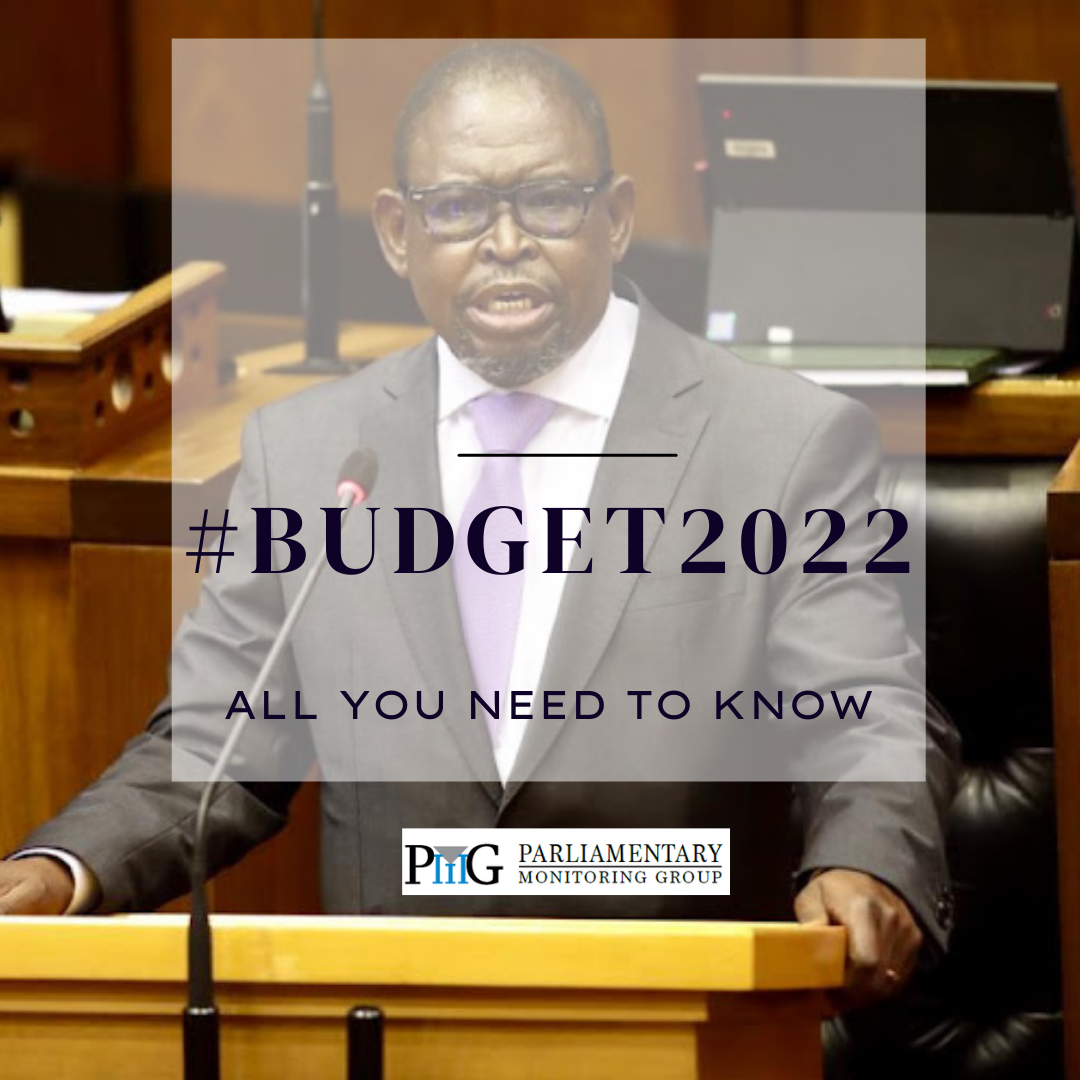#BUDGET2022: All You Need To Know

Every February the Minister of Finance presents the budget speech in Parliament for the upcoming fiscal year. The 2022 Budget will be presented by Minister Godongwana on Wednesday, 23 February 2022.
What is in the budget and why should I care?
The budget presents an overall synopsis of the state of the country’s finances, amendments to tax, distribution of revenue across spheres of government and distribution of expenditure across national departments. This is where the legislation accompanying the budget speech plays a role, namely, the Appropriations Bill, Division of Revenue Bill and Tax Bills. The budget serves as a practical way through which government’s plans and policies are tangibly translated into goods and services.
Since resources are finite, the need for proper budgeting arises to allocate scarce resources to various governmental activities. Every item of expenditure has to be well-thought-out and worked out for a specific period. The budget is arguably the most important government document. It impacts the economy at large and the everyday lives of South Africans.
The Budget Cycle
Although most of us hear about the year’s Budget when it comes to Parliament, it has taken 14 months of work to prepare. In other words, by the time a Budget is introduced, the Budget for the following year has been in preparation already. The process is this lengthy because a number of time-consuming processes must be completed first. Each Budget is part of an ongoing three-year plan called the Medium-Term Expenditure Framework (MTEF). Planned expenditure for the year immediately ahead (year 1 of the MTEF cycle) is fixed while the two years after that (years 2 and 3 of the cycle) are revised in the next budget cycle.
Parliament’s Budgetary Review and Recommendation Reports (BRRRs) are invaluable. These reports are compiled annually (during the midterm budget process) and are based on the work the Committees have done in relation to assessing government performance and audit outcomes and, most importantly, make recommendations and suggestions around the use of financial resources of government departments and entities for the next financial year. A report is included in the Budget Review which responds to concerns raised by the Finance and Appropriations Standing Committees, and by the Portfolio Committees in their BRRRs.
What happens after the speech?
Exercising budgetary and fiscal oversight is one of Parliament's basic tasks. The budget presented by the Minister is not the final budget but a proposal that has to be scrutinised and approved by Parliament.
Some measures, such as tax changes, come into effect on Budget day or soon after but can be overturned later.
After the speech, the debate will move from the chamber to the Committee corridor where - spread out over a couple of months – Committees will hold hearings with the Minister, Parliamentary Budget Office (PBO), Treasury, relevant departments, statutory bodies, economists and civil society before compiling a report (Parliament is currently reviewing the timeframes and sequencing associated with the different financial instruments and Bills, and parliamentary procedures related to them). The Parliamentary Committees under the spotlight during this process are the Standing Committee on Finance and the Standing Committee on Appropriations along with their counterpart Committees in the NCOP. At the same time, the various Money and Tax Bills which give effect to the changes and appropriations in the budget, will be processed.
The Money Bills Amendment Procedure and Related Matters Amendment Act enhances Parliament’s power to amend the budget as a whole and budgets of specific national government entities. Before the Act, first passed in 2009, Parliament could only approve or reject the budget, but not make alterations to it.
Read: Role of Parliament in the Budget
Where can I watch?
You can catch the live broadcast on SABC Radio, SABC TV, various other news broadcasting channels and Parliament TV (DSTV Channel 408). It will also be streamed on Parliament’s social media platforms, namely: Twitter, Facebook and YouTube.
About this blog

"That week in Parliament" is a series of blog posts in which the important Parliamentary events of the week are discussed.
We host the latest posts of this blog, written by People's Assembly. You can find more on PA's blog.
About this blog

"That week in Parliament" is a series of blog posts in which the important Parliamentary events of the week are discussed.
We host the latest posts of this blog, written by People's Assembly. You can find more on PA's blog.
